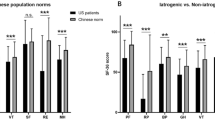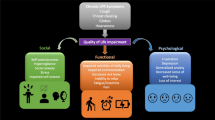Abstract
Patient-reported outcomes (PROs) are integral to determining the success of foregut surgical interventions and psychoemotional factors have been hypothesized to impact the quality of life of patients. This study evaluates the correlation between PROs—specifically the Gastroesophageal Reflux Disease-Health-Related Quality of Life (GERD-HRQL) and the Laryngopharangeal Reflux Symptom Index (LPR-RSI)—and the recently validated Esophageal Hypervigilance Anxiety Scale (EHAS). We hypothesize that patients with higher EHAS scores have significantly elevated GERD-HRQL LPR-RSI compared to those with normal scores. EHAS has been developed and validated in chronic esophageal disorders, but clinical impact is unknown. In this retrospective study, 197 patients (38% men, average age 56 ± 16) completed the following surveys:(1) EHAS, (2) GERD-HRQL, and (3) LPR-RSI. All patients referred for surgical evaluation of GERD completed the surveys as part of their pre-operative workup and post-operative follow-up In bivariate analysis, EHAS correlated with both GERD-HRQL (r 0.53, P = <0.001) and LPR-RSI (r 0.36, P = 0.009). Accounting for potential confounding with sex and age in multivariable linear regression models, a higher GERD-HRQL score (β 0.38; 95% CI 0.29 to 0.48; P = <0.001; Semipartial R2 0.20) and a higher LPR-RSI score (β 0.21; 95% CI 0.13 to 0.29; P = <0.001; Semipartial R2 0.08) were independently associated with higher EHAS. The observed relationship between mental health and GERD symptom intensity is consistent with the biopsychosocial paradigm of illness. Future studies focused on post-surgical outcomes following the incorporation of EHAS into perioperative care is needed to evaluate its effectiveness as a clinical decision support tool in ARS.



Similar content being viewed by others
References
Gong EJ, Choi KD, Jung HK et al (2017) Quality of life, patient satisfaction, and disease burden in patients with gastroesophageal reflux disease with or without laryngopharyngeal reflux symptoms. J Gastroenterol Hepatol 32(7):1336–1340
Ness-Jensen E, Hveem K, El-Serag H, Lagergren J (2016) Lifestyle intervention in gastroesophageal reflux disease. Clin Gastroenterol Hepatol 14(2):175–182 e3
Maret-Ouda J, Wahlin K, El-Serag HB, Lagergren J (2017) Association between laparoscopic antireflux surgery and recurrence of gastroesophageal reflux. Jama 318(10):939–946
Wiklund I (2004) Review of the quality of life and burden of illness in gastroesophageal reflux disease. Dig Dis 22(2):108–114
Tack J, Becher A, Mulligan C, Johnson DA (2012) Systematic review: the burden of disruptive gastro-oesophageal reflux disease on health-related quality of life. Aliment Pharmacol Ther 35(11):1257–1266. https://doi.org/10.1111/j.1365-2036.2012.05086.x
Spechler SJ, Hunter JG, Jones KM et al (2019) Randomized trial of medical versus surgical treatment for refractory heartburn. N Engl J Med 381(16):1513–1523
Emken B-EG, Lundell LR, Wallin L et al (2017) Effects of omeprazole or anti-reflux surgery on lower oesophageal sphincter characteristics and oesophageal acid exposure over 10 years. Scand J Gastroenterol 52(1):11–17
Vakil NB, Halling K, Becher A, Ryden A (2013) Systematic review of patient-reported outcome instruments for gastroesophageal reflux disease symptoms. Eur J Gastroenterol Hepatol 25(1):2–14
Francis DO, Patel DA, Sharda R et al (2016) Patient-reported outcome measures related to laryngopharyngeal reflux: a systematic review of instrument development and validation. Otolaryngol Head Neck Surg 155(6):923–935
Tack J, Becher A, Mulligan C, Johnson D (2012) Systematic review: the burden of disruptive gastro-oesophageal reflux disease on health-related quality of life. Aliment Pharmacol Ther 35(11):1257–1266
Velanovich V (2003) The effect of chronic pain syndromes and psychoemotional disorders on symptomatic and quality-of-life outcomes of antireflux surgery. J Gastrointest Surg 7(1):53–58. https://doi.org/10.1016/s1091-255x(02)00136-1
Kamolz T, Granderath FA, Pointner R (Jan 2003) Does major depression in patients with gastroesophageal reflux disease affect the outcome of laparoscopic antireflux surgery? Surg Endosc 17(1):55–60. https://doi.org/10.1007/s00464-002-8504-8
Taft TH, Triggs J, Carlson DA et al (2018) Validation of the oesophageal hypervigilance and anxiety scale for chronic oesophageal disease. Aliment Pharmacol Ther 47(9):1270–1277
Osheroff JA (2012) Improving outcomes with clinical decision support: an implementer’s guide. Himss
McCoy AB, Melton GB, Wright A, Sittig DF (2013) Clinical decision support for colon and rectal surgery: an overview. Clin Colon Rectal Surg 26(01):023–030
McKinley B, Sailors R, Glorsky S et al (2001) Computer directed resuscitation of major torso trauma: 137. Shock 15:46
Moore LJ, Turner KL, Todd SR, McKinley B, Moore FA (2010) Computerized clinical decision support improves mortality in intra abdominal surgical sepsis. Am J Surg 200(6):839–844
Moore FA, McKinley BA, Moore EE (2004) The next generation in shock resuscitation. Lancet 363(9425):1988–1996
Thomsen GE, Pope D, East TD et al (1993) Clinical performance of a rule-based decision support system for mechanical ventilation of ARDS patients. Am Med Infor Assoc 339
Francis DO, Patel DA, Sharda R et al (2016) Patient-reported outcome measures related to laryngopharyngeal reflux: a systematic review of instrument development and validation. Otolaryngol Head Neck Surg 155(6):923–935. https://doi.org/10.1177/0194599816664330
Gong EJ, Choi KD, Jung HK et al (2017) Quality of life, patient satisfaction, and disease burden in patients with gastroesophageal reflux disease with or without laryngopharyngeal reflux symptoms. J Gastroenterol Hepatol 32(7):1336–1340. https://doi.org/10.1111/jgh.13716
Bradley LA, Richter JE, Pulliam TJ et al (1993) The relationship between stress and symptoms of gastroesophageal reflux: the influence of psychological factors. Am J Gastroenterol 88(1)
Roman S, Keefer L, Imam H et al (2015) Majority of symptoms in esophageal reflux PPI non-responders are not related to reflux. Neurogastroenterol Motility 27(11):1667–1674
Haug TT, Mykletun A, Dahl AA (2002) Are anxiety and depression related to gastrointestinal symptoms in the general population? Scand J Gastroenterol 37(3):294–298. https://doi.org/10.1080/003655202317284192
Hu WHC, Wong WM, Lam CLK et al (2002) Anxiety but not depression determines health care-seeking behaviour in Chinese patients with dyspepsia and irritable bowel syndrome: a population-based study. Aliment Pharmacol Ther 16(12):2081–2088. https://doi.org/10.1046/j.1365-2036.2002.01377.x
Jansson C, Nordenstedt H, Wallander MA et al (2007) Severe gastro-oesophageal reflux symptoms in relation to anxiety, depression and coping in a population-based study. Aliment Pharmacol Ther 26(5):683–691. https://doi.org/10.1111/j.1365-2036.2007.03411.x
Aro P, Talley NJ, Ronkainen J et al (2009) Anxiety is associated with uninvestigated and functional dyspepsia (Rome III criteria) in a Swedish population-based study. Gastroenterology 137(1):94–100
Kamolz T, Velanovich V (2002) Psychological and emotional aspects of gastroesophageal reflux disease. Dis Esophagus 15(3):199–203
Kamolz T, Bammer T, Granderath FA, Pointner R (2001) Laparoscopic antireflux surgery in gastro-oesophageal reflux disease patients with concomitant anxiety disorders. Dig Liver Dis 33(8):659–664. https://doi.org/10.1016/s1590-8658(01)80041-4
Kamolz T, Granderath FA, Bammer T, Pasiut M, Pointner R (2001) Psychological intervention influences the outcome of laparoscopic antireflux surgery in patients with stress-related symptoms of gastroesophageal reflux disease. Scand J Gastroenterol 36(8):800–805. https://doi.org/10.1080/003655201750313306
Velanovich V, Karmy-Jones R (2001) Psychiatric disorders affect outcomes of antireflux operations for gastroesophageal reflux disease. Surg Endosc 15(2):171–175. https://doi.org/10.1007/s004640000318
Lord RV, Kaminski A, Öberg S et al (2002) Absence of gastroesophageal reflux disease in a majority of patients taking acid suppression medications after Nissen fundoplication. J Gastrointest Surg 6(1):3–10
Khajanchee YS, O'Rourke RW, Lockhart B, Patterson EJ, Hansen PD, Swanstrom LL (2002) Postoperative symptoms and failure after antireflux surgery. Arch Surg 137(9):1008–1014
Lindau ST, Laumann EO, Levinson W, Waite LJ (2003) Synthesis of scientific disciplines in pursuit of health: the interactive biopsychosocial model. Perspect Biol Med 46(3 Suppl):S74
Ayers DC, Franklin PD, Ring DC (2013) The role of emotional health in functional outcomes after orthopaedic surgery: extending the biopsychosocial model to orthopaedics: AOA critical issues. J Bone Joint Surg Am 95(21)
Berliner JL, Brodke DJ, Chan V, SooHoo NF, Bozic KJ (2017) Can preoperative patient-reported outcome measures be used to predict meaningful improvement in function after TKA? Clin Orthop Relat Res 475(1):149–157
Lundell L, Miettinen P, Myrvold H et al (2001) Continued (5-year) followup of a randomized clinical study comparing antireflux surgery and omeprazole in gastroesophageal reflux disease. J Am Coll Surg 192(2):172–179
Epstein D, Bojke L, Sculpher MJ (2009) Laparoscopic fundoplication compared with medical management for gastro-oesophageal reflux disease: cost effectiveness study. Bmj. 339:b2576
Anvari M, Allen C, Marshall J et al (2011) A randomized controlled trial of laparoscopic Nissen fundoplication versus proton pump inhibitors for the treatment of patients with chronic gastroesophageal reflux disease (GERD): 3-year outcomes. Surg Endosc 25(8):2547–2554
Grant A, Boachie C, Cotton S et al (2013) Clinical and economic evaluation of laparoscopic surgery compared with medical management for gastro-oesophageal reflux disease: 5-year follow-up of multicentre randomised trial (the REFLUX trial). Health Technol Assessment (Winchester, England) 17(22):1
Hatlebakk JG, Zerbib F, des Varannes SB et al (2016) Gastroesophageal acid reflux control 5 years after antireflux surgery, compared with long-term esomeprazole therapy. Clin Gastroenterol Hepatol 14(5):678–685 e3
Kellokumpu I, Voutilainen M, Haglund C, Färkkilä M, Roberts PJ, Kautiainen H (2013) Quality of life following laparoscopic Nissen fundoplication: assessing short-term and long-term outcomes. World J Gastroenterol: WJG 19(24):3810
Hamdy E, El Nakeeb A, Hamed H, El Hemaly M, ElHak NG (2014) Outcome of laparoscopic Nissen fundoplication for gastroesophageal reflux disease in non-responders to proton pump inhibitors. J Gastrointest Surg 18(9):1557–1562
Zhang C, Hu Z-W, Yan C et al (2017) Nissen fundoplication vs proton pump inhibitors for laryngopharyngeal reflux based on pH-monitoring and symptom-scale. World J Gastroenterol 23(19):3546
Swoger J, Ponsky J, Hicks DM et al (2006) Surgical fundoplication in laryngopharyngeal reflux unresponsive to aggressive acid suppression: a controlled study. Clin Gastroenterol Hepatol 4(4):433 e1
Ayazi S, Zheng P, Zaidi AH et al (2020) Clinical outcome and predictors of favorable result after laparoscopic magnetic sphincter augmentation: single institution experience with over 500 patients. J Am Coll Surg
Francis DO, Goutte M, Slaughter JC et al (2011) Traditional reflux parameters and not impedance monitoring predict outcome after fundoplication in extraesophageal reflux. Laryngoscope 121(9):1902–1909
Ayers DC, Franklin PD, Trief PM, Ploutz-Snyder R, Freund D (2004) Psychological attributes of preoperative total joint replacement patients: implications for optimal physical outcome. J Arthroplast 19(7):125–130
Ring D, Leopold SS (2015) Measuring satisfaction: can it be done? Springer
Author information
Authors and Affiliations
Corresponding author
Ethics declarations
Disclosures
Drs. Hill, Versluijs, Furay, Ring, Buckley, Mr. Holan, and Alexander, Mrs. Reese-White, and Ms. Doggett have no conflicts of interest or financial ties to disclose.
Additional information
Publisher's Note
Springer Nature remains neutral with regard to jurisdictional claims in published maps and institutional affiliations.
Rights and permissions
About this article
Cite this article
Hill, C., Versluijs, Y., Furay, E. et al. Psychoemotional factors and their influence on the quality of life in patients with GERD. Surg Endosc 35, 7219–7226 (2021). https://doi.org/10.1007/s00464-020-08145-8
Received:
Accepted:
Published:
Issue Date:
DOI: https://doi.org/10.1007/s00464-020-08145-8




